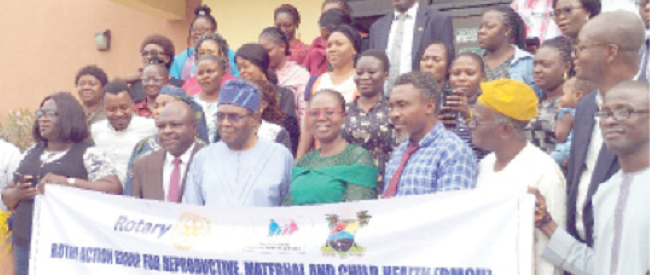ROTARY International says its target is to reduce at least 25 percent of malaria cases in Ikeja, Festac, and two other local governments among pregnant women and children under five years old over the next three years as part of its interventions to improve the health of pregnant women and children in Nigeria.
The project, tagged “Little Steps, Big Steps: Tackling Malaria and Malnutrition among Pregnant Women and Under-5 Children in Lagos State,” and under the initiative of the Rotary Action Group for Reproductive Maternal and Child Health (RMCH), will also tackle cases of malnutrition in the 34 Primary Healthcare Centres (PHCs) within Ikeja, Festac, Ibeju-lekki, and Ijaye Local Government Areas in the state involved in the project.
The project’s manager and Rotary Past Governor, Mr Adeniji Raji, speaking at the opening of the project and a 2-day refresher workshop for health care workers in Lagos, described malaria and malnutrition as significant challenges in these local government areas, particularly in pregnant women and under-five children.
Mr Raji declared that 25 percent of global malaria cases worldwide are in Nigeria, while 22 percent of children are underweight, urging the healthcare workers to make the training the beginning of a united front against malaria and malnutrition and change the world, one healthy life at a time.
“Malaria and malnutrition have long cast a shadow over our state, but we are here to reclaim the light of health and wellbeing.
“This training is more than just an opportunity for professional development; it is a chance to equip ourselves with the tools and strategies to tackle these health challenges head-on, to transform the health landscape of Lagos, and most importantly, to save lives.
“Malaria and malnutrition are both closely related, like Siamese twins. One can lead to another. We think that after the training to prepare the health workers on what to do and the strategies to diagnose and treat malaria, we will be able to reduce the incidence of malaria in Lagos State by at least 25 percent and will also reduce malnutrition in children under 5.”
RMCH’s Lagos state project chairman, Dr Femi Oloyede, declared that many children do not sleep under insecticide-treated nets, malaria testing before treatment is low, and attendance at antenatal care clinics by pregnant women is late and poor, as challenges to ensuring malaria cases are greatly reduced in Nigeria.
“This should be of concern and make health workers key into programmes that will reduce these statistics. They are the first point of contact when it comes to reducing the burden of malaria and malnutrition.”
Dr Oloyede said the choice of the four local governments for the intervention was based on their high prevalence of malaria and malnutrition, adding, “Some of these areas that we assume are high-brow still have ghettos in them, thus the cases of malaria and malnutrition.”
Earlier, Pharmacist Sakirat Adeosun, Director of Pharmaceutical Services, Lagos State Primary Health Care Board, was represented by Pharmacist Samson Oyekoya, who thanked Rotary International for its leadership in lowering cases of malaria and malnutrition in Lagos State and guaranteed high-quality antimalarial medications for treatment throughout the state.
